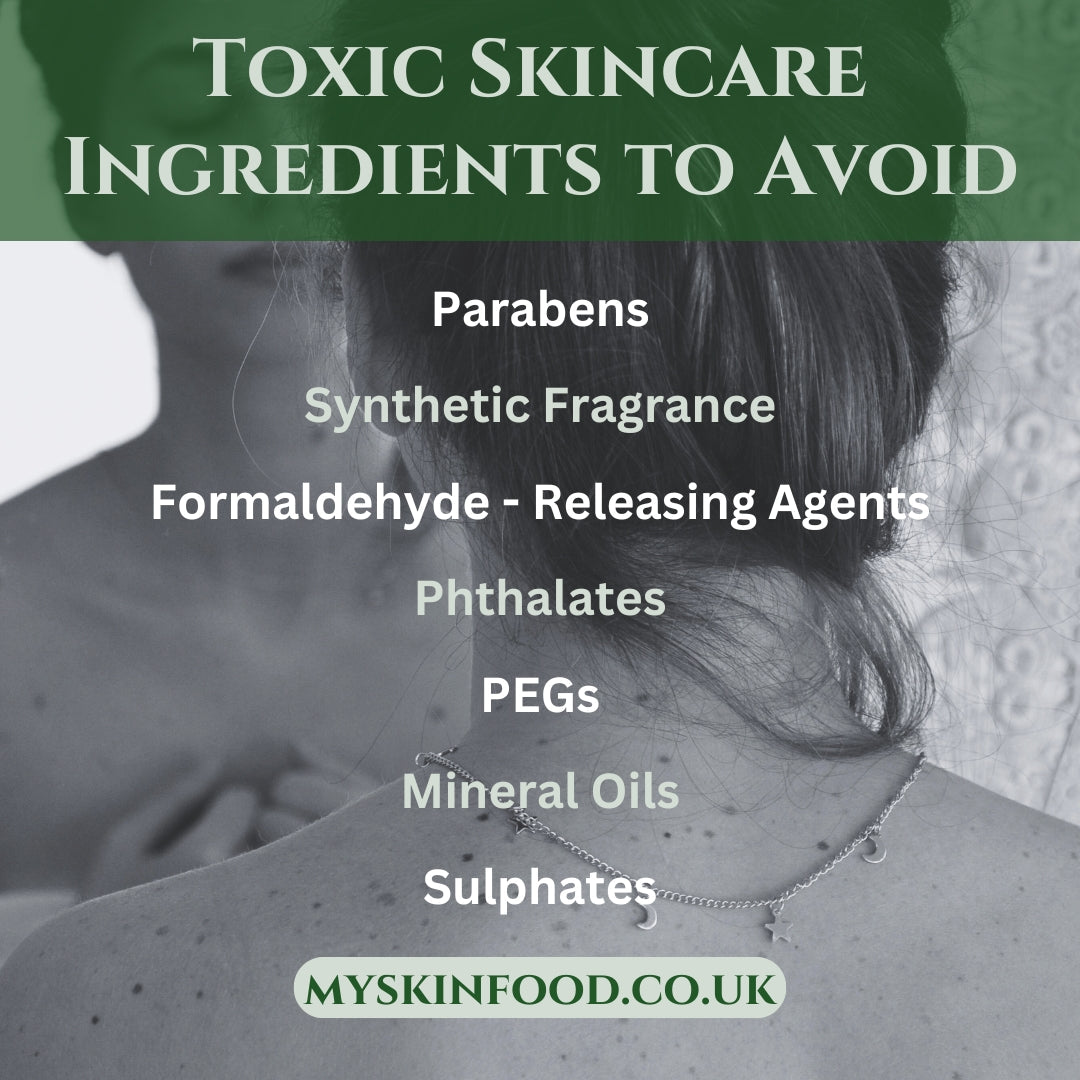What’s Hidden in Your Skincare?
Navigating the world of skincare can feel like decoding a foreign language. With rows of brightly packaged products boasting "hydrating," "brightening," and "anti-ageing" properties, it’s easy to get caught up in the hype. But if you flip over that jar or bottle and take a closer look at the ingredient list, what’s really in there?
Many conventional skincare products are packed with harsh chemicals that, over time, can harm your skin’s health. For those of us who value a natural, mindful approach to self-care, understanding what to avoid is key to making better choices for both our skin and the planet.
Let’s take a closer look at some common skincare villains that might be lurking in your beauty cabinet.
Parabens: The Preservative That’s Past Its Prime
Parabens are a group of chemicals used as preservatives in beauty and skincare products to prevent mould and bacteria growth. While this might sound like a good thing, the risks far outweigh the benefits.
Parabens mimic oestrogen in the body, interfering with hormone systems and potentially raising concerns about their links to certain cancers. If you spot ingredients like methylparaben, ethylparaben, or butylparaben, consider reaching for an alternative.
Luckily, brands like My Skinfood offer a range of paraben-free skincare products that prioritise both your health and their fresh, waterless formulations.
Sulphates: The So-Called "Cleansing Agents"
Sulphates, such as sodium lauryl sulphate (SLS) and sodium laureth sulphate (SLES), are surfactants that create a satisfying lather in products like face washes and shampoos. The problem? They strip your skin of natural oils, leaving it dry, irritated, and prone to sensitivity.
For those looking to protect their skin’s natural barrier (and who isn’t?), avoiding sulphates is a must. Replacing harsh cleansers with gentle, oil-based or balm cleansers crafted through natural processes can make all the difference.
Synthetic Fragrances: The Hidden Irritant
The word "fragrance" on an ingredient list might seem harmless—pleasant, even. But don’t be fooled. The term often hides a cocktail of synthetic chemicals that can cause allergic reactions, skin irritation, or even disrupt hormones.
The skin, particularly on the face, is more sensitive than we might realise. Treat your skin with love by opting for products that use essential oils or natural extracts for that signature scent.
Phthalates: The Plasticiser You Don’t Want on Your Skin
Phthalates are found in some fragrances and are used to make plastics more flexible. In skincare, they act as stabilisers or softening agents. Unfortunately, they’re also a suspected endocrine disruptor, making them an ingredient firmly on the "avoid" list for health-conscious consumers.
Choosing phthalate-free options ensures you’re minimising the risk of long-term effects on your body’s hormone system.
Formaldehyde-Releasing Agents: The Preservative You Should Question
While formaldehyde itself might not appear on your skincare label, ingredients like DMDM hydantoin, imidazolidinyl urea, and quaternium-15 can release it over time. Known to be a carcinogen, formaldehyde exposure through skincare can harm skin sensitivity and worsen issues like eczema.
Brands focused on ethical, natural solutions understand the importance of keeping such toxic chemicals far away from your skincare routine.
Mineral Oils: The Hidden Barrier
Mineral oils and their derivatives, such as petroleum jelly, often carry enticing claims like "locks in moisture." The reality is that mineral oil sits on the skin’s surface, creating a barrier that traps dirt and bacteria while stopping your skin from breathing.
For truly nourishing hydration, plant-based oils like argan, rosehip, or jojoba are superior. These are the powerhouse ingredients brands like My Skinfood lovingly incorporate into their 100% natural, vegan, and organic products.
PEGs (Polyethylene Glycols): The Potentially Contaminated Fillers
Frequently used as thickeners or solvents in creams and moisturisers, PEGs are synthetic polymers derived from petroleum. Their real danger lies in the potential contamination with harmful substances like 1,4-dioxane—a possible carcinogen.
Using products with plant-based alternatives is a much smarter and skin-friendlier route to take.
Why Do These Ingredients Still Exist?
It might leave you wondering why products containing these questionable chemicals still line the shelves. Truthfully, they’re often cheap, effective at achieving the product’s immediate purpose, and easy to source in large quantities. However, long-term skin health and environmental concerns tell another story.
Choosing Better for You and the Planet
So, what can you do? Learning to read skincare labels is a valuable skill, and switching to brands that focus on natural, ethical alternatives is easier now than ever. When you support companies that prioritise sustainability and carefully select their ingredients, you’re not only taking better care of your skin but also making a positive environmental choice.
Take My Skinfood, for example. Each of their products is waterless, vegan, and freshly handcrafted in the UK with pure, cold-pressed organic oils. With a deep respect for nature and a commitment to ethical production, the brand ensures its skincare is free from all the harmful ingredients we’ve outlined above. Their products cater to a range of skincare needs, allowing you to pamper yourself guilt-free and feel confident in what you’re applying to your skin.
Switching your skincare doesn’t have to be overwhelming—it’s one small but impactful step toward healthier skin and a kinder impact on the world. Browse through thoughtfully crafted, clean alternatives like those from My Skinfood and experience the difference of truly natural skincare.
By nurturing your skin with care and consideration, you’re investing in something that goes beyond the surface. Remember, what you put on your skin matters. Choose wisely, and your skin will thank you.

